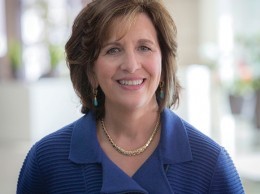Today, Pamela Lopker is the founder, president and chairman of the board of Santa Barbara-based QAD, a $220-million-a-year manufacturing software company with 1,300 employees.
But back in the in the 1970s, Lopker, the daughter of a U.S. Navy engineer, was coding software at a defense subcontractor when she realized she had brighter career prospects.
“As a female, I could not go shipboard or on these military bases. I could see that I was always going to be a peripheral sort of person rather than a core customer interaction person,” Lopker said.
Speaking at CSU Channel Islands on Oct. 8, Lopker described her rise from UC Santa Barbara student to one of the most prominent women in the manufacturing world. In 2001, Fortune magazine called her “the queen of elegant software” for factories.
Lopker paid her own way for her math and economics degree at UCSB. But near the end of her time there, she started to branch out.
“I didn’t really want to think of waitressing at Sambo’s as my college exit job,” Lopker said. “Computer science was a growing field. My senior year, I went over to the engineering department and took all the computer science classes I could.”
That led to a decent post-college job working on real-time defense systems for Navy ships. Though it paid well — $12,000 a year, or about $44,000 in today’s dollars, Lopker said — she lived modestly, saving a third of her income to team with friends and buy a fixer-upper in Santa Barbara.
“When you graduate and get a job, continue living like a student,” Lopker said, directing her remarks to the students in the audience. “You don’t have to be in business for yourself to be an entrepreneur.”
But seeing the limits on her prospects in the defense industry, Lopker got into business software. The company she worked at served a variety of industries, but none of them well. When her boyfriend at the time — Karl Lopker, a co-founder of the successful Goleta shoe firm Deckers Outdoor Corp. — needed manufacturing software, she couldn’t in good conscience recommend her employer’s offering.
“We had 30 to 40 customers at this company, and I couldn’t say that any of them were happy,” Lopker said. “From there, I learned to focus.”
Lopker quit her job and wrote the software herself, aiming to serve manufacturers. She married Karl Lopker, who eventually joined the firm, helping to grow it from $2 million in 1985 revenues to about $80 million by 1990. After an initial public offering in 1997, the company started trading on the Nasdaq. Together, the Lopkers own about 60 percent of QAD.
When QAD launched, it had hundreds of competitors, Lopker said. That number has dropped to about five, including some big players such as SAP and Oracle, and smaller ones such as Paso Robles-based IQMS. But QAD never jumped on the consolidation trends in the industry because the Lopkers realized how hard it can be for software companies to integrate their platforms.
“Ford bought Jaguar and then they tired to use the same platform to make a Jaguar as to make a Taurus. Remember when the Jaguar became a Taurus for a little while?” Lopker said. “We bought a few point solutions, but we didn’t buy competing wholes.”
These days, Lopker said QAD’s biggest opportunities lie in cloud computing so that her firm can offer on-demand services. If a domestic client bought a foreign facility, for example, all that would be needed is an Internet connection to roll out QAD’s software in the new factory.
Lopker predicts a long, slow slog upward from the current recession. And Lopker — who, along with her husband, has been a generous supporter of UCSB’s engineering and computer science programs, as well as other education causes — said it’s “really sad to see” California’s state budget unravel, often to the detriment of schools.
“There’s plenty of revenue there,” Lopker said. “We’re just not spending it correctly.”






 Print
Print Email
Email

















